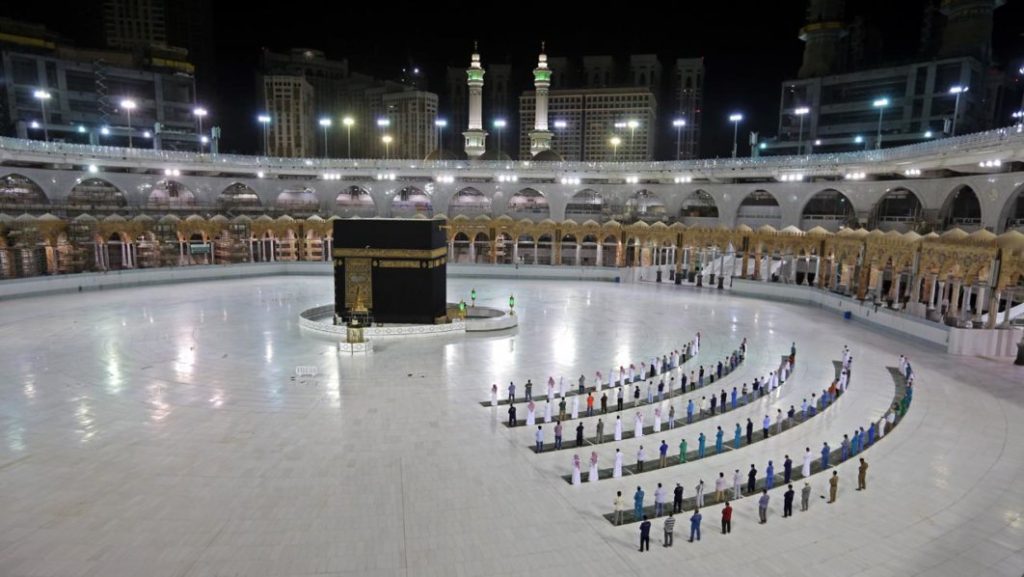 Kassim Alabi, Vice President of the Association of Hajj and Umrah Tour Operators of Nigeria (AHUON), missed out on the Hajj pilgrimage last year owing to the COVID-19 pandemic. With the announcement by the Saudi Arabian government to bar the participation of international pilgrims in this year’s Hajj, Alabi has been left counting his losses. For starters, within two days of the announcement, he was inundated with demands for a refund of deposits made by intending pilgrims for the journey. And he had to cough out N10.6 million in restitution.
Kassim Alabi, Vice President of the Association of Hajj and Umrah Tour Operators of Nigeria (AHUON), missed out on the Hajj pilgrimage last year owing to the COVID-19 pandemic. With the announcement by the Saudi Arabian government to bar the participation of international pilgrims in this year’s Hajj, Alabi has been left counting his losses. For starters, within two days of the announcement, he was inundated with demands for a refund of deposits made by intending pilgrims for the journey. And he had to cough out N10.6 million in restitution.
The cancellation of the international Hajj for the second consecutive year by the Saudi government undoubtedly elicits concerns among stakeholders who are currently groaning and expressing disappointment amid uncertainties.
Scores of pilgrims who had deferred the religious rites in 2020 have expressed utter disappointment that the 2021 Hajj will not hold again for international pilgrims, despite the administration of COVID-19 vaccines for pilgrims.
Saudi Arabian authorities barred international pilgrims for the 2021 Hajj, declaring that only 60,000 pilgrims, including its citizens and nationals residing in the country, would participate in the exercise.
This decision dashed the hope of about 70,000 intending Nigerian pilgrims, who already made deposits while some obtained COVID-19 vaccines as part of conditions for the exercise.
Hajj 2021 rites commenced on Saturday, July 17, 2021, and continue till Thursday, July 22, 2021. Hajj operators and logistics value chains have been thrown into confusion. An estimated sum of about N220 billion is the total paid to airlines, hoteliers, transporters, hajj operators, and states’ pilgrim boards.
Alabi told the media that the situation has led to a collapse of several businesses, while people working for hajj operators and other logistic firms would lose their jobs.
“People made deposits for Hajj. Now we are confused as to what to do. We thought we could do what we did last year when we asked people to defer the trip. But intending pilgrims are asking for a refund already.
“Another point is that many tour operators have sacked their staff because they could not cope with the financial commitments. For me, my staff have been on half salary since last year, while we only come three times a week. We do hope that things will change for the better soonest,” Alabi said.
However, some intending pilgrims have decided to keep their money until next year to hope that Hajj will hold and don’t want to divert the funds to other things.
Reacting to this development, Alabi said those rolling over their money would be given priority in 2022, even though they may have to add more funds based on prevailing factors. “There is no way the hajj fare will not go up next year, considering inflation, exchange rate and cost of logistics such as increasing price of hotels, among others,” he said.
Professor of English (Communication and Language Arts), Department of English, and Chief Imam, University of Abuja Central Mosque, Taofiq AbdulAzeez, said the cancellation for the second year running would have a lot of consequences.
He noted that the issue was spiritually frustrating for intending pilgrims. He says some pilgrims might abandon the religious project because it also has an economic consequence as most people usually struggle to get the money. “Some of them might divert the money to other projects because people have competing demands they need to spend money on,” he noted.
Expressing his disappointment, AbdulAzeez said: “We are not comfortable with safety being used as the excuse for the cancellation. The argument is that whether there is COVID-19 or not, people die ordinarily at Hajj. A Muslim is not afraid of dying while worshipping Allah. Hajj is a spiritual jihad. When you go out for jihad, you are going with two possibilities. Either you die in the process and achieve martyrdom, enter Aljanat, or survive it; both are victories. But, stopping people from worshipping Allah smacks of spiritual conspiracy against Muslims.”
“There are a lot of conspiracy theories around COVID-19 and its vaccine. You have allowed people to take the vaccine. Yet, you are saying that despite the vaccination, they still cannot come for a pilgrimage. That means the vaccine does not guarantee protection. If the vaccine guarantees their safety against COVID-19, it should be enough to allow people to go for Hajj. They may even compel pilgrims to come early, take the vaccine, isolate them and then allow them to perform the pilgrimage. If these things are not happening, then it is a huge statement against the vaccine. It means people were just tricked into getting the vaccine,” he said.
Decision To Bar Pilgrims Justified, Shows Islam Cares
National Missioner, Nasirullahi-l-Fathi Society of Nigeria (NASFAT) Abdul Azeez Onike, said the cancellation showed that Islam is a religion that cares about the welfare of people.
“Al-Quran is very clear about Hajj. It says, ‘those who can afford it should perform hajj when the way is clear.’ So, suppose the way is unclear regarding safety situation or health situation or anything that can hinder Hajj proceedings. In that case, you may not do it. The fact that COVID-19 is around showing that the road is not clear.
“The custodians of the mosque see that it would affect the safety of people before making that decision because the objective of Shariah is to resist any harm on anybody, and Allah knows best.
“The most interesting thing about Islam is that once you have a good intention to do anything, Allah would have rewarded you. Islam is not a do or die religion. Just as you are allowed to reduce your Solat when you are travelling, no fasting when travelling or sick. No leaf will fall from a tree without the knowledge of Allah,” he said.
Professor of Middle Eastern, North African and Cultural Studies and Dean, Faculty of Arts, University of Ibadan, Afis Oladosu, said: “I consider the decision very smart and a very proactive one for that matter. This is because one of the fundamental conditions guiding the performance of Hajj is the safety and security of life and properties of pilgrims.
“Besides, for those who are aware of the fundamental principles guiding rituals and other acts of worship in Islam, barring non-Saudis from performing the Hajj should have no negative effects on the spiritual or communal welfare of Muslims all around the world at least in the long term. On the contrary, it should, in my opinion, serve as an inspiration and a fountain of hope in the believers that since Allah was fully aware of the necessity and conditions that led to the current situation, He would most certainly grant them relief and reward them for their inability to perform the Hajj,” he said.
Oladosu said that those who intended to perform the Hajj could not do so due to the blockade. It is expected that Muslims, who could not go on Hajj, will look forward to the rituals beginning from the first ten days of the month of Dhul-Hijjah.
“These include fasting, almsgiving and glorification of the Almighty. These rites or rituals usually reach their peak when Muslims observe the Eid on the 10th day of the month by offering sacrifice to the Most Beneficent,” he said.
On his part, Chief Imam, Usman Bin-Anfan Central Mosque, Gadan Kaya, Kano, Dr Mohammad Aliyu Yunus urged Muslims intending to perform Hajj to accept the condition as a trial from Allah. The Islamic scholar believes that the intending pilgrims can still earn the reward of Hajj, even as they cannot travel to Saudi Arabia, as Allah rewards all action based on initial intention.
“The cancellation is a tremendous loss, especially for those already making payment and preparing their mind to undergo the spiritual exercise, but as Muslims, we don’t have a choice than to remain steadfast and of a firm conviction that it is the will of Allah and surely it will come to pass.
A consultant, a public health practitioner with Aminu Kano Teaching Hospital, Dr Bashir Usman, also considered Saudi Arabia’s decision the best public health safety measure, especially as many countries in the world are presently witnessing a new variant of COVID-19.
Dr Bashir, a former head of the medical team, Kano State Pilgrims Welfare Board, revealed that the holy sites would have turned into another incubation centre for the virus if the pilgrimage was not limited to a maximum controlled number.
“When you look at it from a public health perspective and the developing event relating to the pandemic, you will realise the decision was the best. Remember, there was precedence in India early this year when citizens returned home from across the world to celebrate their annual religious rituals. What followed was an upsurge of COVID-19. They are still battling the impact as we speak.
“Likewise, Hajj is a convergence of global citizens with different experiences. Suppose anybody contracted the virus from their country only to spread during Hajj. In that case, the dangerous aspect is, citizens of other countries will further spread the virus because you hardly contain social distance during Hajj. Another issue is the people coming with fake vaccine cards during the lesser Hajj. Incidentally, many of them were detected and detained, unable to perform Umrah because antibody tests were conducted on them, which clearly proved that their cards were fakes. These are part of the issues that have justified the decision taken by the Saudi government.”
On what is expected of the Nigerian government ahead of the 2022 hajj, Dr Bashir said, “First, the government must improve vaccine coverage in the country. People are still unwilling to administer the vaccine due to misinformation, mysterious beliefs, and rumours about the vaccine. So, the government is advised to do more sensitisation while providing more vaccines for people.”
Pilgrims Boards Offer Refunds
The National Hajj Commission of Nigeria NAHCON has assured intending pilgrims that their deposits would be refunded without delay. In a statement by its Head, Public Affairs, Fatima Sanda Usara, it said: “NAHCON respects the decision of Saudi Arabia in this regard no matter how painful the decision may be to us and to intending pilgrims worldwide. We have accepted that Allah’s divine design that multitudes will again this year not perform the Hajj: the Kingdom of Saudi Arabia is only playing out a script ordained by our Maker long before creating the universe. Our prayer is that we collectively turn to Him in repentance so that He admits us for Hajj in the coming years.”
Usara quoted the NAHCON Chairman, Zikrullah Kunle Hassan, as commending the resilience of Nigerian intending pilgrims and the support they have shown in the long and tortuous wait.
https://guardian.ng/saturday-magazine/cover/hajj-cancellation-dashed-hopes-as-faithful-stakeholders-rue-losses/

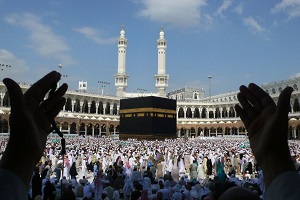

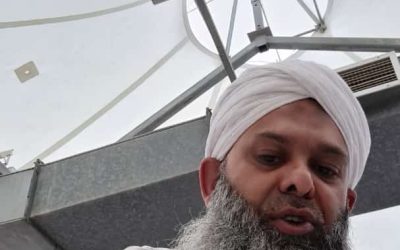
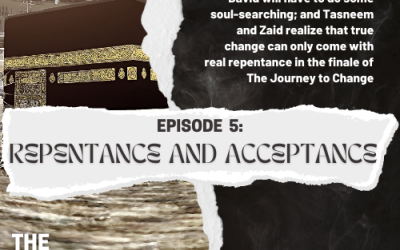
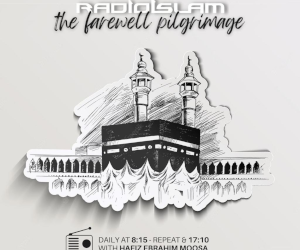

0 Comments